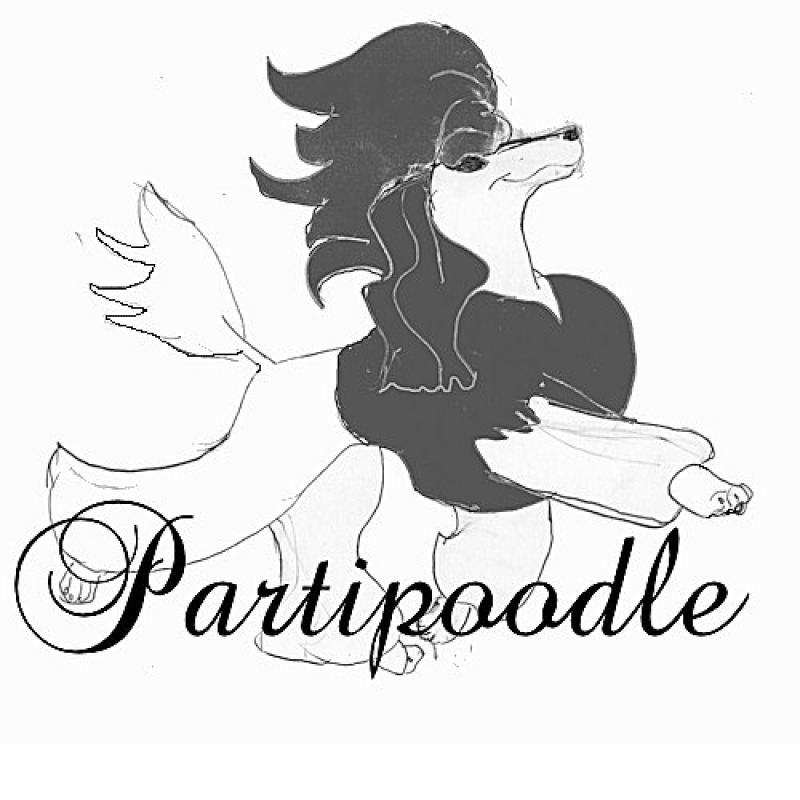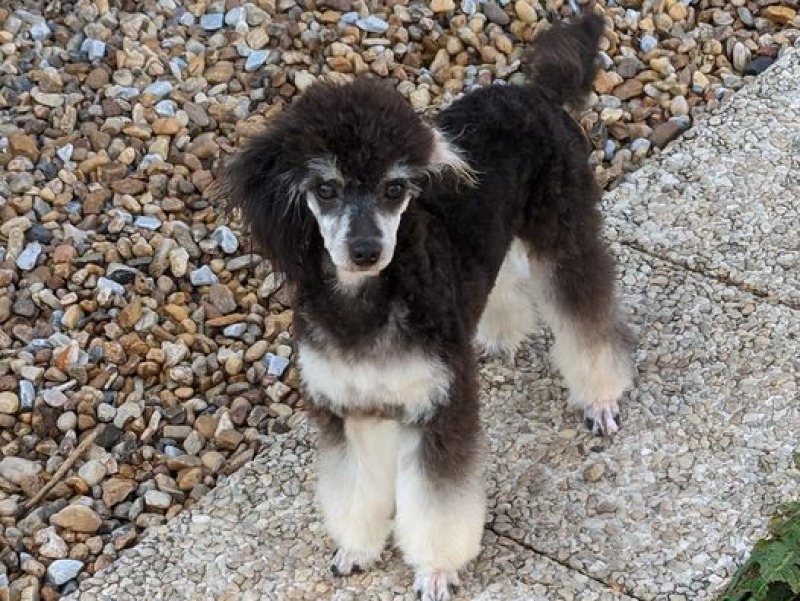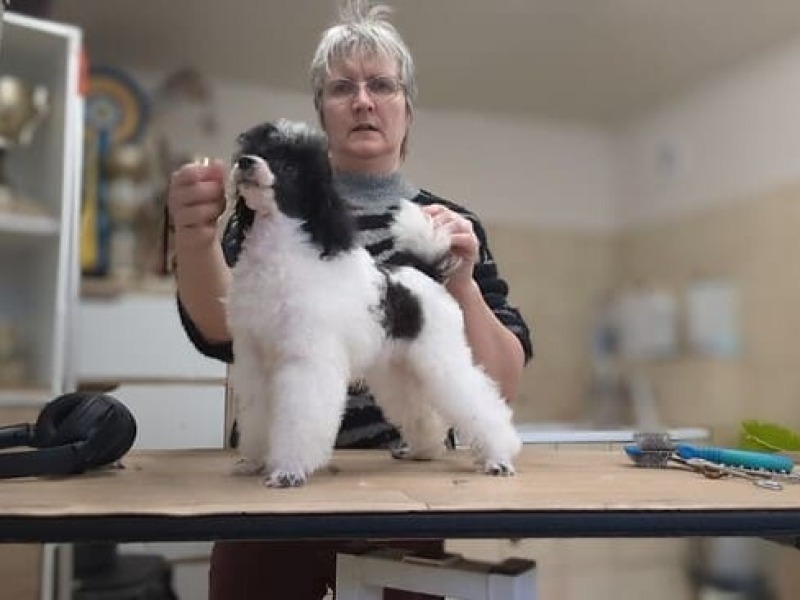Toy poodle
Welcome to our page dedicated to the breed of dog toy poodle!
Here, you will find all the useful information about toy poodle. This descriptive profile will allow you to discover the aspects of this breed. You can notably consult information about the average price, monthly and annual upkeep expenses, their health, name ideas, as well as their official recognition by competent authorities.
Explore this page to discover everything you need to know.
Overall description of the breed
The Toy Poodle is a breed of French origin that has been used as a water dog for centuries, proving to be particularly successful in this field. In the past, it was the favourite dog of Louis XVI, which made its fame soar among the general population. A direct descendant of the Barbet, a name inspired by the verb "to paddle", the word Poodle comes from the term used to designate the duck's wife "la cane", as it was used mainly for duck hunting, so the term Poodle quickly became established.
Its aquatic hunting skills are also represented in other countries and languages, such as the German Pudel or the English Poodle, which means "swimmer". The breed is undoubtedly the most popular and widespread in the world today. Its standard was established in 1936, then the FCI registered it definitively on 1 January 1955 and the last update of the official standard in force was published on 3 November 2014.
There are four varieties of Poodle, morphologically identical and distinguished only by the size of the withers which can vary from simple to double, it is composed of the Large Poodle, the Medium Poodle, the Dwarf Poodle or the Toy Poodle.
The Toy Poodle has a balanced and harmonious body overall, their apparent fragility hides a robust dog with an iron health. They have lovely proportions, slightly longer than they are tall, their body is rectangular, with a clean line of back and discreetly rounded at the loins. His lower limbs are straight, perfectly parallel, stable supports which give him a lot of power and agility.
His musculature is prominent, the neck moderately long, thick, but without excess, with a head built lengthwise which remains nicely in tune with the rest of his body, the stop is not very marked. His ears are also long, running along his cheeks and part of his neck, always rounded at the ends. The coat of the Toy Poodle is abundant, of a fine, woolly, well curled texture, elastic and resistant to hand pressure. The colours of coat permitted by the breed standard are black, white, brown, grey, fawn, the coat must be plain.
His character is jovial and sociable, he is a remarkable daily companion, notably thanks to his legendary good humour and his natural tenderness towards his owners. He will enjoy the company of all members of his family, especially when it comes to taking part in games or sharing moments, he will also be calm and docile when necessary.
Overflowing with vitality, he will need regular play and sporting activities, however, a daily walk will be more than enough for him to channel himself and will be peaceful once inside the house. It is a versatile pet with good adaptability and will do well in both urban and rural areas.
Devoted and loving to please his loved ones, he will try by all means to satisfy them thanks to his highly developed intelligence, moreover, he has great learning abilities whether in the field of work, hunting or pure obedience. The Toy Poodle is a dog that is close to its master, even fusional, which makes it difficult for it to endure prolonged periods of solitude. It would be a good idea to get it used to being alone from a very young age so as not to increase its anxious temperament.
In conclusion, the Poodle Toy is a faithful and loyal dog to his family, appreciated by all, he is a wonderful daily companion for adults and children alike.
The weight of the Toy Poodle will be a maximum of 4 kg (8.8 lbs) and its height at the withers varies between 24 to 28 cm (9.5" to 11").
Awareness of acquiring an animal
Each animal is a sensitive being, deserving love, attention and care.
When you choose to adopt an animal, you take on the responsibility of ensuring its health and well-being throughout its life.
To learn more about animal welfare, we invite you to consult our FAQ by clicking the button below:
Origins
The Toy Poodle is the smallest variant of the Poodle breed, whose origins date back to Germany and France, where it was used as a water hunting dog. Over time, this breed has become a symbol of elegance and status, particularly valued in the French royal courts.
History
Developed from the Standard Poodle to be a parlor companion for the nobility and bourgeoisie, the Toy Poodle gained popularity due to its small size and ability to learn tricks. In the 20th century, its popularity expanded, making it a global favorite as a pet dog.
Standard
According to the standard of the Fédération Cynologique Internationale (FCI), the Toy Poodle must not exceed 28 cm at the withers. It shares the same physical characteristics as the other Poodle varieties, including a curly or corded coat, available in various colors.
Physical characteristics
The Toy Poodle is distinguished by its small, elegant body, dense, curly fur, and expressive, bright eyes. Despite its small size, it is well-proportioned and agile, with a proud and confident demeanor.
Character
This little dog is intelligent, lively, and affectionate, forming strong bonds with its owners. It is known to be cheerful and energetic, but can also be shy with strangers. Its size makes it suited for apartment living.
Life expectancy
Toy Poodles have an average lifespan of 12 to 15 years. Paying special attention to their health and diet can help extend their life.
Exercise and activity needs
Although small in size, the Toy Poodle needs regular exercise to stay fit and happy. Daily walks and play sessions are usually enough to meet its activity needs.
Recommended diet
A balanced diet suited to the size, age, and activity level of the Toy Poodle is essential for maintaining its health. It's important to monitor portion sizes to prevent overweight.
Training and obedience
Thanks to its intelligence, the Toy Poodle learns quickly. Positive and consistent training is recommended to encourage obedience and good manners.
Behavior with children
With proper socialization, the Toy Poodle can be a good companion for children. However, its small size requires supervision to prevent accidental injuries.
Compatibility with Other Animals
This dog usually gets along well with other pets, especially if they have been raised together or properly introduced.
Grooming needs
The coat of the Toy Poodle requires regular maintenance, including frequent brushing and professional grooming to prevent tangles and keep the coat healthy.
Health
Toy Poodles are generally healthy, but can be prone to certain genetic conditions, such as dental problems and eye diseases. Regular veterinary checks are recommended.
Average price
The cost of a Toy Poodle puppy can range from 1000 to 2500 euros, depending on the lineage and the breeder's reputation.
Expenses
The annual costs for maintaining a Toy Poodle, including food, veterinary care, and grooming, can amount to about 1000-1500 euros.
Name ideas
Names such as Fifi, Pixie, Teddy, Bella, and Coco are popular for Toy Poodles, reflecting their playful personality and small size.
Legislation and regulation
There is no specific legislation or particular regulation applicable only to the Toy Poodle.
As with all dog breeds, owners are encouraged to adhere to local regulations regarding pet ownership, such as registration, vaccination, and leashing in public spaces.
Some areas may have specific laws on the size and weight of dogs allowed in certain housing, which could potentially benefit the Toy Poodle due to its small size.
Official recognition
The Toy Poodle is officially recognized by the main global canine organizations, including the International Canine Federation (FCI), the American Kennel Club (AKC), the Kennel Club (United Kingdom), and the Canadian Kennel Club (CKC). These organizations provide detailed breed standards that describe the ideal physical and behavioral characteristics of the Toy Poodle.
Pedigrees
Pedigrees are available for Toy Poodles through previously mentioned breed clubs and recognized canine organizations. A pedigree is an official document that records a dog's lineage, providing information about its ancestors, often across several generations. This helps maintain and monitor the quality of the breed in terms of health, temperament, and conformity to breed standards.
Destination and usage
Traditionally raised as a companion and lap dog for the upper classes, the Toy Poodle still excels in this role today. Its small size and affectionate temperament make it an excellent companion for apartment living and for people looking for an engaging and intelligent pet dog. Toy Poodles are also competitive in various dog sports suited to their size, such as agility for small breeds and conformation shows.
Prohibitions
There are no specific prohibitions concerning the Toy Poodle breed itself. However, owners should be aware of local regulations that might affect the rights of possession or care requirements for small dogs.
As with all pets, it is important to ensure that the Toy Poodle receives proper care, including regular grooming, a balanced diet, and regular veterinary visits to ensure a long and healthy life.
Breeders of Toy poodle
Want to see more breeders of Toy poodle?
Check out the page of our directory listing all breeders of Toy poodleClassified Ads of Toy poodle
Breed clubs of toy poodle
No of toy poodle breed clubs are currently registered on Preeders.
If you would like to highlight your breed club, sign up for free now and be the first to appear on this page.





